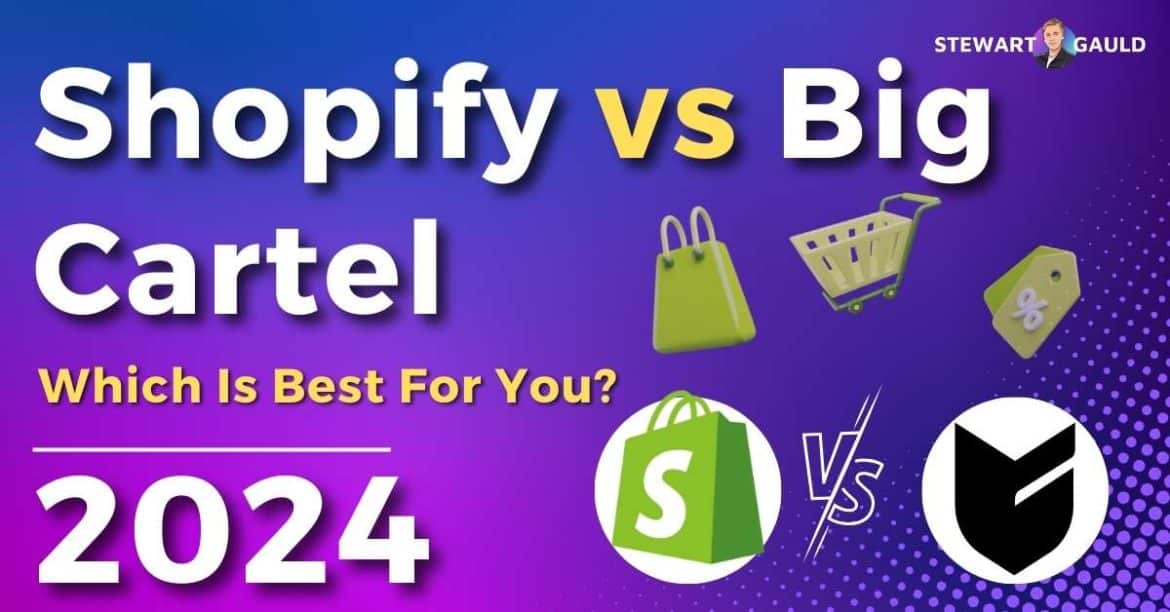In this comparison guide, I’ll dive into Shopify vs Big Cartel to determine which online store builder is best for you
Are you looking to launch an online store but stuck between Shopify and Big Cartel?
You’ve most likely heard of Shopify, an impressive platform that hosts over 5 million online stores globally (February 2024).
However, amidst the sea of Shopify loyalists, a community of Big Cartel fans have entered the chat, and they’re adamant that it is the best eCommerce tool on the market!
So, which platform will help you set up, manage, and drive your store to success?
Read more: How To Sell Your Products Online?
Quick Summary
- If you’re a creator or artist and just want a standalone storefront to sell a few products, Big Cartel’s simple, free, and user-friendly interface is an excellent choice.
- Shopify is the best premium option for teams of any size and skill set looking to build and manage a scalable online store.
- Big Cartel offers a free plan (Shopify doesn’t). However, there are limited eCommerce, marketing, and customization options compared with Shopify.
Shopify vs Big Cartel 2024
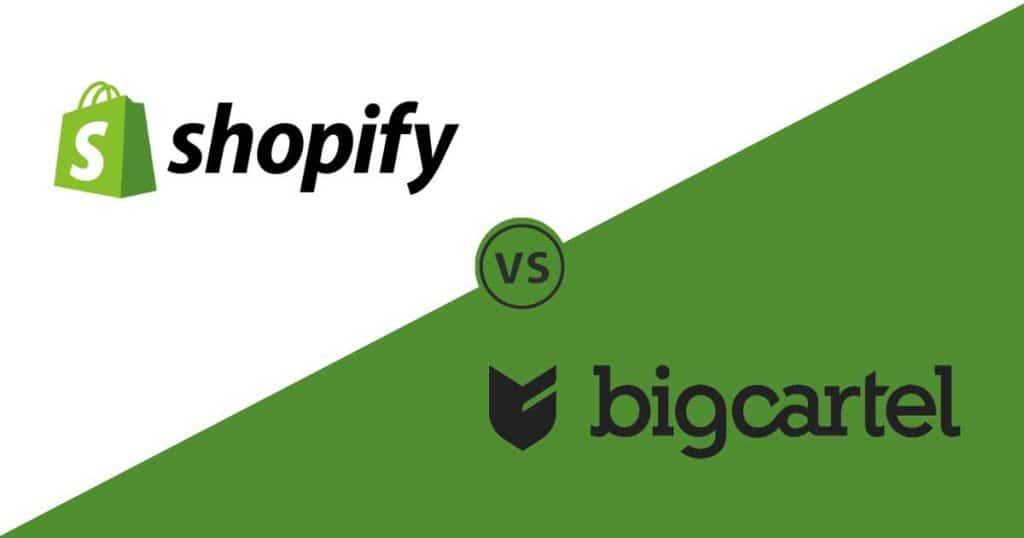
As the eCommerce landscape evolves, selecting the right online store platform that meets your business needs is imperative.
In this blog post, I will delve into the nitty gritty of Shopify and BigCartel to help make that decision easier!
I will unravel the unique features, advantages, and drawbacks of Shopify and Big Cartel, ultimately guiding you toward the ideal online store solution for you.
What Are They? Shopify vs Big Cartel
Shopify is an all-in-one eCommerce ecosystem that offers various solutions to help you operate a fully functional standalone online store website.
With each plan, Shopify goes above and beyond by delivering advanced features to help you scale your business to new heights!
Big Cartel is a smaller, simple, cloud-hosted gem that proudly supports over 180,000 live websites.
This straightforward and easy-to-use platform provides all the essential eCommerce features to create a standalone online storefront.
Shopify and Big Cartel are eCommerce platforms that allow individuals and businesses to build and operate online stores. Both tools allow you to:
- Sell and take customer payments online.
- Ship globally.
- Sell your products offline.
But don’t be fooled! Shopify and Big Cartel cater to very different types of online stores.
Let’s dive into specifics now.
Read more: Do You Need an LLC For Shopify?
What Are The Differences Between Shopify vs Big Cartel?
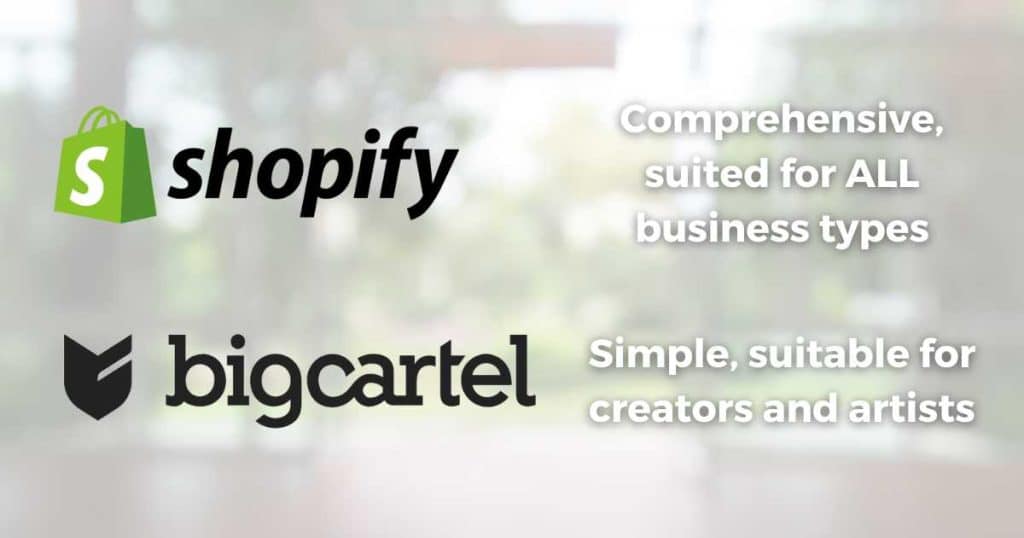
Shopify is the ultimate solution for all businesses looking for comprehensive features such as inventory management, abandoned cart recovery, and dropshipping within their store.
That’s right, whether you’re a startup, a growing team, or an enterprise-level corporation, Shopify supports your dreams every step of the way.
In contrast, Big Cartel is a simpler platform, more suited for smaller businesses and creatives looking for a minimalist approach to their online store design.
Big Cartel holds a special place in the hearts of creators or artists who prefer a less competitive digital landscape.
And while it may not have all Shopify’s bells and whistles, Big Cartel offers something that Shopify doesn’t: A free plan!
So, which is best to help with your business’s brand, awareness, and growth?
It’s time to explore their features to find out!
Read more: Ecwid vs Shopify.
Ease Of Use
It’s no secret that Shopify and Big Cartel offer intuitive interfaces that make setting up your online store a breeze.
Shopify manages to provide a comprehensive yet user-friendly dashboard despite its extensive feature set!
Adding products, payment methods, and shipping options can be easily accomplished, even without extensive technical knowledge.
However, the sheer number of features may overwhelm some users. And you may need a helping hand for more extensive customization.
Big Cartel prides itself on a minimalist approach, catering to artists and creators who actually prefer a simplified interface.
With a clean and straightforward design, Big Cartel allows you to set up your store and start selling in no time!
During the sign-up process, you’re presented with a checklist outlining everything you need to know to make your store look professional.
Big Cartel’s user-friendly platform makes it an accessible choice for those seeking a streamlined selling experience.
And unlike Shopify, Big Cartel provides real-time instructions for each section, ensuring a seamless and hands on experience.
Winner = Big Cartel.
Read more: Weebly vs Shopify.
Pricing
Shopify:
- Starter: $5 per month (No website).
- Basic: $39 per month (Online store capabilities and unlimited products).
- Shopify: $105 per month (Advanced marketing and automation tools, lower transaction fees).
- Advanced: $399 per month (Real-time shipping rates and international sales tools).
- Shopify Plus Plans start from $2000 (Best for high-volume businesses).
There are also payment processing fees, transaction fees (for external payment processing platforms), premium themes, and Shopify fulfillment services that come at an additional cost.
Big Cartel:
- Gold: Free (5 products).
- Platinum: $9.99 per month (50 products).
- Diamond: $19.99 per month (500 products).
Although there are limitations on how much you can sell within each plan, the costs are significantly less than Shopify’s.
Plus, there are no hidden fees with Big Cartel!
Winner = Big Cartel.
Read more: Shopify vs Shopify Plus.
Customization And Templates
Shopify currently (February 2024) offers 180 professional and fully customizable themes, with 12 of them available for free.
Paid themes range in price from $140-$400, and each theme has been designed with specific niches in mind.
However, with such a low number of free themes, not every free theme may suit your business.
This means you may have to fork out hundreds of dollars for a theme (on top of your premium pricing plan cost).
In saying this, Shopify’s level of theme customization is unmatched, with their easy-to-use drag-and-drop editor by your side!
And for those who want to enhance the brand identity of their store even more, Shopify provides the flexibility to customize themes using its template language, Liquid.
This powerful tool not only enables you to create a visually appealing and branded storefront but also allows you to infuse dynamic content into your store pages!
What more could you want?
On the flip side, Big Cartel offers a modest selection of 18 aesthetically pleasing themes and templates, all available at no cost.
These themes are elegantly pre-customized to cater to the needs of artists and creators.
You can still customize the font and colors of your theme, but there certainly are limitations. For example, if you want to insert your images, you must use code.
Additionally, you can’t customize your theme on the free plan. So, if you’re not willing to invest in a paid plan, the look and feel of your storefront is quite limited.
Winner = Shopify.
Read more: ClickFunnels vs Shopify.
Shopify vs Big Cartel Key Features
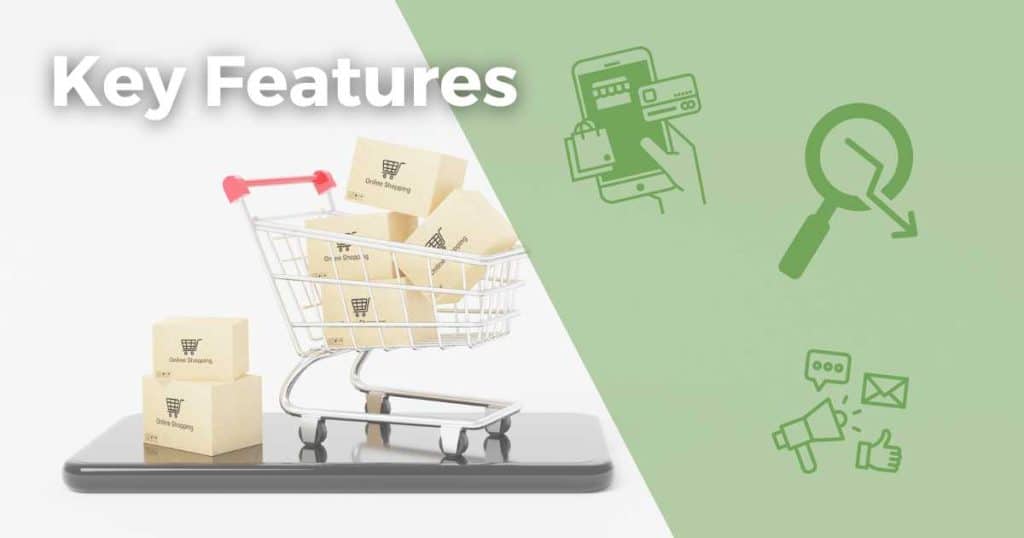
eCommerce Tools
I wasn’t kidding when I said that Shopify is the ultimate eCommerce tool to help establish and expand your online store!
Let’s talk about why.
With no product limitations, you can add as many items as your business needs!
And for those seeking to sell multiple types of products, you’re in luck! Shopify provides an easy-to-use ‘Bulk import’ feature.
Shopify offers many advanced features, such as unlimited bandwidth, mobile POS capabilities, robust tracking and analytics tools, and much more.
Additionally, Shopify supports multi-channel selling across Amazon, Facebook, Instagram, Pinterest, and more and empowers you to sell digital and physical products with their global fulfillment service.
With an integrated POS system, abandoned cart recovery, unlimited product listings, inventory management, automatic shipping rates, integrated payment gateways, discounts, and more, Shopify truly encompasses the wide-ranging needs of online retailers.
On the other hand, while Big Cartel’s user-friendly environment is appealing, it struggles to match Shopify in this round.
But that’s okay! The good news is that they do offer some pretty awesome eCommerce tools.
These include:
- Unlimited bandwidth.
- Product variants.
- Discount codes.
- Free themes.
- Bulk editing.
- Inventory tracking.
- Shipment tracking.
- Google Analytics integration and more.
In saying this, there’s no abandoned cart recovery on Big Cartel, which is pretty disappointing.
Winner = Shopify.
Read more: How To Remove Powered By Shopify On Your Website?
SEO And Marketing
There’s no doubt about it: Shopify’s built-in marketing tools give them the cutting-edge in this round!
In addition to online stores, did you know you can launch a blog, optimize your website through SEO, and create Facebook Ads, all within Shopify?
When it comes to SEO, Shopify includes excellent features across its plans.
Your website is fast and responsive, and as you add products to your store, you can customize the page title and meta description.
The URL handle section lets you update or modify the URL for each specific product, allowing shoppers to easily find a product page directly (instead of the homepage).
But it doesn’t stop there! If that wasn’t enough, you can leverage third-party SEO apps to optimize your web pages further.
In addition to SEO, Shopify Email is another built-in marketing tool where you can send targeted and customized emails to your subscribers.
On the other hand, while Big Cartel themes are structured with proper headers, valid markups, and clear navigation, there are some limitations.
While you can edit URL structures, you’ll have limited control over edited product URLs (as you can’t redirect them).
Another drawback of Big Cartel is that you can’t change meta descriptions for existing product listings.
If you want to do this, you must create a new listing – which is quite a pain!
Big Cartel doesn’t offer built-in email marketing tools, but you can connect it to Google Analytics to monitor your site’s performance or integrate apps such as MailChimp.
Read more: Google Analytics Integration For Shopify.
Payment Gateways
If you want to sell more, your store should offer a wide range of payment processing options and gateways.
Luckily, both platforms excel in this area!
Shopify supports over 100 payment processors and gateways, including PayPal, Stripe, Google Pay, Apple Pay, and Square.
However, there is a huge drawback – you’ll have to pay a transaction or processing fee for each sale, which can add up quite quickly, especially if you’re selling a lot!
An alternative to avoid these charges is to use Shopify’s in-house payment gateway, Shopify Payments.
On the other hand, Big Cartel also supports major payment gateways such as PayPal, Stripe, Apple Pay, and Venmo.
The difference? Big Cartel doesn’t charge transaction fees (note: you’ll still pay a processing fee).
Winner = Draw.
Read more: Shopify vs Etsy.
Shopify vs Big Cartel Customer Support
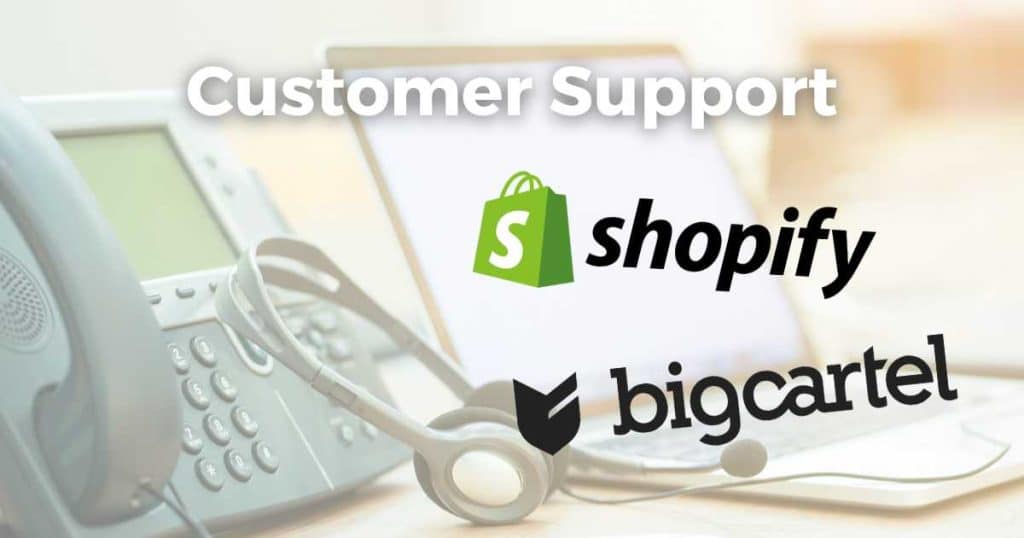
Shopify is known for its strong emphasis on customer satisfaction, and it doesn’t disappoint
As a Shopify user, you have access to 24/7 customer support service through multiple channels, including email, live chat, phone, and a customer forum.
Plus, simply join the dedicated Shopify social media communities where you can interact with professional sellers (and benefit from their experience!)
Need extra help? Shopify’s comprehensive Help Center provides a range of articles, guides, and documentation to help you with any further questions!
In contrast, customer reviews and testimonials indicate that Big Cartel’s customer support is not up to scratch.
The company only provides support through email and live chat, and email support is limited to business days, which is a bit of a pain.
Although there’s a handy live chat feature, it’s automated and primarily designed to offer solutions for basic queries.
Winner = Shopify.
Read more: Is It Better To Use Shopify or Wix?
Who Are They Best For? Shopify vs BigCartel
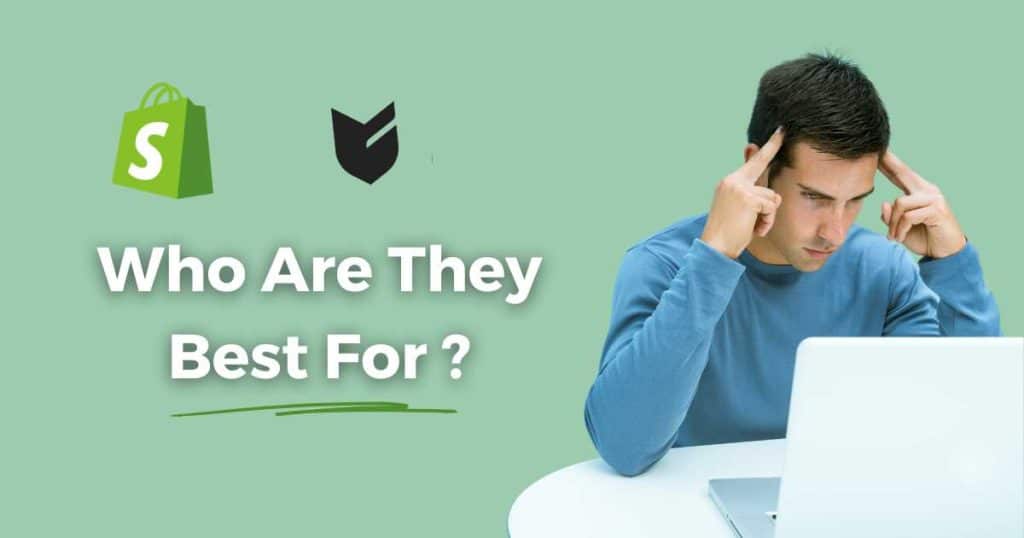
If you’re looking for an online store builder that allows you to sell your products without any code, both tools deliver!
However, when comparing the two, Shopify outshines Big Cartel in several aspects.
While Big Cartel is recognized as a reputable eCommerce platform, it is a smaller company primarily catering to individual sellers and artists.
Let me be clear: using Big Cartel is totally fine (if that’s what you’re after!)
If you’re an artist or creative on a budget and sell just a few products, Big Cartel is all you need to get up and running online.
But if scalability and exponential growth are your goals, Shopify is definitely your best option
Suitable for any eCommerce business, all Shopify plans include advanced eCommerce tools and features that allow you to run a fully customized and professional storefront.
My Final Thoughts
And that’s it! You’ve reached the end of this Shopify vs Big Cartel guide.
While Big Cartel may initially appeal due to its affordability and user-friendly interface, it falls short in several aspects, and you may quickly outgrow its capabilities.
Shopify, on the other hand, offers a more comprehensive solution that can accommodate your growing needs.
I know it’s a bit more pricey, but I truly think that Shopify is the best all-in-one eCommerce solution for any type of online store serious about driving growth and conversions!
So, what will you be picking? Shopify vs Big Cartel?
